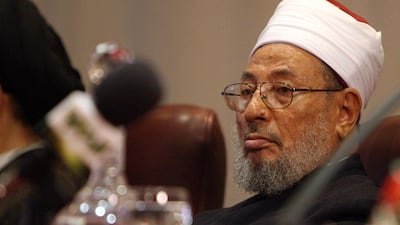For many people, Yusuf Al Qaradawi epitomises moderate Islam. From banning female circumcision to allowing coeducation, the Qatar-based Egyptian cleric’s bold and progressive edicts have challenged conservative views for decades. But he often comes under fire for his views in favour of suicide bombing.
In April 2001, Dr Al Qaradawi said it was permissible for Palestinians to carry out suicide operations targeting Israelis, and described the tactic as “one of the greatest forms of jihad”. He was responding to a counter fatwa by Saudi Arabia’s grand mufti, Abdelaziz Al Sheikh. When Al Jazeera reported on the issue, it concluded: “Such a fatwa is specifically common among Palestinians fighting against the Israeli occupation.”
But the fatwa created a slippery slope. In 2014, Dr Al Qaradawi expanded the remit of his fatwa to civil wars in the Middle East. He said that it was acceptable for Syrians to blow themselves up, as long as the bomber acts as “part of a group”. Individuals cannot do it, he emphasised.
These attacks spare no one, including Muslim worshippers inside mosques. During Ramadan last year, for example, suicide attacks hit Turkey, Bangladesh, Iraq and Saudi Arabia, and killed nearly 350 people. A suicide attacker struck near the burial site of the Prophet Mohammed, killing four security guards.
After the attack in Saudi Arabia, Ibrahim Munir, the deputy leader of the Muslim Brotherhood, asked clerics to rethink their opinion on suicide operations. “Killing innocent civilians has become common because suicide bombers rely on these fatwas to blow themselves up,” he said.
Suicide bombing is rejected by traditional clergy because suicide is explicitly prohibited in the Quran. Islamist clerics, such as Dr Al Qaradawi, who have a mainstream following legitimise views long perceived to be fringe and extremist. Also, these clerics sometimes preside over councils or are close to religious institutions that operate in the West. Dr Al Qaradawi is chairman of the European Council for Fatwa and Research.
When he was criticised for his views on suicide bombing after the Medina attack, countless supporters expressed solidarity with him. Some pointed out that other clerics have also sanctioned suicide bombing.
What many of those who defended Dr Al Qaradawi’s view on suicide bombing do not realise, though, is that their cleric walked back on his edict in the summer.
“The Palestinian brothers were in need of the [tactic] to instal terror told in the hearts of Israelis,” he said in July. “They told me they no longer need it, so I told them I no longer approve of it.”
The way he disavowed the fatwa is telling – as though he prescribed medicine to a patient. The prescription was stopped because the patient no longer needed it. He failed to disapprove of the practice in general. He made no mention of his approval of the tactic in Syria. The genie is out of the bottle and the side effects are too damaging.
The story of Dr Al Qaradawi and the fatwa he issued more than 15 years ago should be part of the continuing debate over whether the new United States administration should designate the Muslim Brotherhood a terrorist organisation. The arguments raised by supposed experts tend to be ignorant of the insidious aspects of Islamism.
A key problem with the current debate is that opposition to the designation has led to outright apologism. Even if one argues that the US government should not label the Muslim Brotherhood a terrorist organisation, a mechanism to address the contribution of such groups to the jihadist world view should be in place. The opposite is happening: academics and so-called experts often call for engaging Islamists as representatives of Muslim communities, as the previous American administrations effectively did.
Suicide operations have become an accepted political tactic against opponents everywhere, not only by ISIL but also by groups that subscribe to less extremist ideologies. Should policymakers continue to ignore the fact that it is Islamist clerics such as Dr Al Qaradawi who approve of such tactics, in stark contrast to traditional clergy?
Designating the Brotherhood as a terroist group might not help, but something needs to be done to counter these views. How do the US and other countries determine that clerics such as Dr Al Qaradawi should be stopped from promoting violence in their communities or online? The Muslim Brotherhood affirm peaceful political engagement yet their television channels and writings promote extremism.
Experts who oppose the idea of designating the Brotherhood a terrorist group tend to gloss over such issues. Recognition of the troubling discourse and views that often help groom youngsters for jihadism is critical, if the world is to properly deal with the issue of terrorism.
Hassan Hassan is a senior fellow at the Tahrir Institute for Middle East Policy. Ola Salem is a journalist in Virginia, the United States

